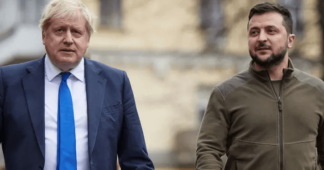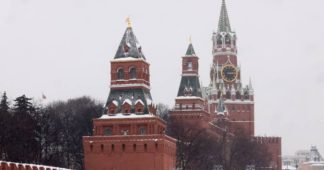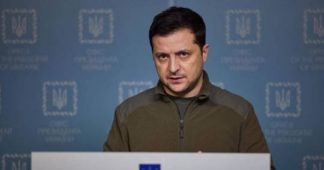Bennett says the US and its Western allies decided to ‘keep striking Putin’ and not negotiate
Posted on
Categories Former Israeli Prime Minister Naftali Bennett said in an interview posted to his YouTube channel on Saturday that the US and its Western allies “blocked” his efforts of mediating between Russia and Ukraine to bring an end to the war in its early days.
On March 4, 2022, Bennett traveled to Russia to meet with President Vladimir Putin. In the interview, he detailed his mediation at the time between Putin and Ukrainian President Volodymyr Zelensky, which he said he coordinated with the US, France, Germany, and the UK.
Bennett said that both sides agreed to major concessions during his mediation effort. For the Russian side, he said they dropped “denazification” as a requirement for a ceasefire. Bennett defined “denazification” as the removal of Zelensky. During his meeting in Moscow with Putin, Bennett said the Russian leader guaranteed that he wouldn’t try to kill Zelensky.
The other concession Russia made, according to Bennett, is that it wouldn’t seek the disarmament of Ukraine. For the Ukrainian side, Zelensky “renounced” that he would seek NATO membership, which Bennett said was the “reason” for Russia’s invasion.
Reports at the time reflect Bennet’s comments and said Russia and Ukraine were softening their positions. Citing Israeli officials, Axios reported on March 8 that Putin’s “proposal is difficult for Zelensky to accept but not as extreme as they anticipated. They said the proposal doesn’t include regime change in Kyiv and allows Ukraine to keep its sovereignty.”
Discussing how Western leaders felt about his mediation efforts, Bennett said then-British Prime Minister Boris Johnson took an “aggressive line” while French President Emmanuel Macron and German Chancellor Olaf Scholz were more “pragmatic.” Bennett said President Biden adopted “both” positions.
But ultimately, the Western leaders opposed Bennet’s efforts. “I’ll say this in the broad sense. I think there was a legitimate decision by the West to keep striking Putin and not [negotiate],” Bennett said.
When asked if the Western powers “blocked” the mediation efforts, Bennet said, “Basically, yes. They blocked it, and I thought they were wrong.”
Explaining his decision to mediate, Bennett said that it was in Israel’s national interest not to pick a side in the war, citing Israel’s frequent airstrikes in Syria. Bennett said Russia has S-300 air defenses in Syria and that if “they press the button, Israeli pilots will fall.”
Negotiations between Russia and Ukraine didn’t stop with Bennett’s efforts. Later in March, Russian and Ukrainian officials met in Istanbul, Turkey, and followed up with virtual consultations. According to the account of former US officials speaking to Foreign Affairs, the two sides agreed on the framework for a tentative deal. Russian officials, including Putin, have said publicly that a deal was close following the Istanbul talks.
But the negotiations ultimately failed after more Western pressure. Boris Johnson visited Kyiv in April 2022, urging Zelensky not to negotiate with Russia. According to a report from Ukrainska Pravda, he said even if Ukraine was ready to sign a deal with Russia, Kyiv’s Western backers were not.
Later in April, Turkish Foreign Minister Mevlut Cavusoglu said there were some NATO countries that wanted to prolong the war in Ukraine. “After the talks in Istanbul, we did not think that the war would take this long … But, following the NATO foreign ministers’ meeting, it was the impression that… there are those within the NATO member states that want the war to continue, let the war continue and Russia gets weaker. They don’t care much about the situation in Ukraine,” Cavusoglu said.
A few days after Cavusoglu’s comments, Secretary of Defense Lloyd Austin admitted that one of the US’s goals in supporting Ukraine is to see Russia “weakened.”
We remind our readers that publication of articles on our site does not mean that we agree with what is written. Our policy is to publish anything which we consider of interest, so as to assist our readers in forming their opinions. Sometimes we even publish articles with which we totally disagree, since we believe it is important for our readers to be informed on as wide a spectrum of views as possible.










